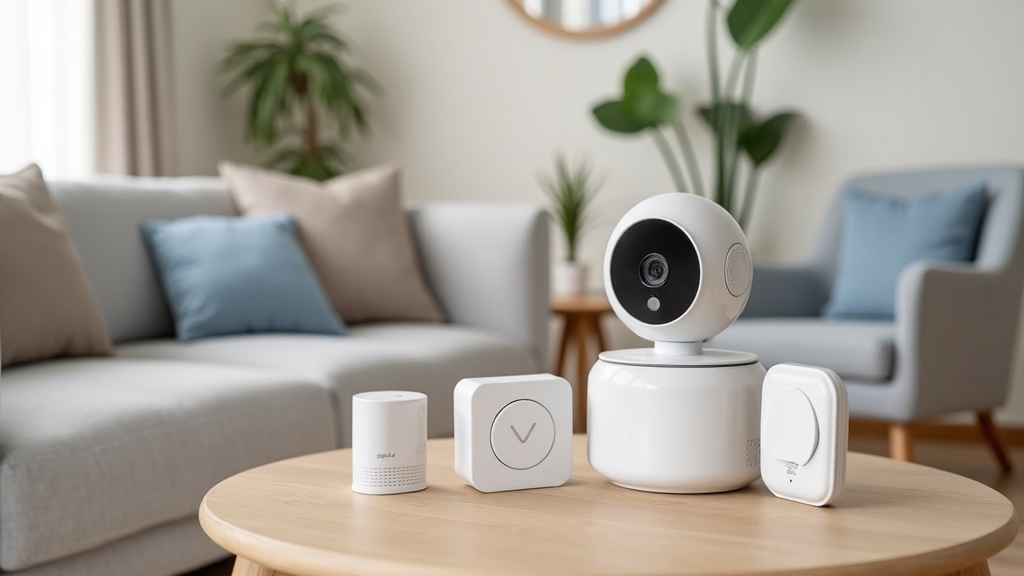If you host Airbnb guests, home security is likely something you’ve thought about. Unlike permanent solutions, temporary smart home security device rental kits make it easy to keep your place safe while still respecting guest privacy. These kits are becoming a go-to option for short-term rentals, letting you give a boost to security during a stay and remove the tech when not needed.

Why Temporary Smart Home Security Device Rentals Make Sense for Airbnb
Short-term rental owners face a unique challenge: you want to keep your property protected but don’t want to invest in permanent tech that might not be needed year round. Smart security kits designed for temporary use can be set up in minutes and packed away easily, all without major changes to your space or extra costs when your home sits empty.
A lot of rental kits include tools like smart door locks, motion sensors, noise monitors, and sometimes small, privacy-friendly cameras that only monitor entries. These systems are flexible, and most can be controlled right from your phone. That’s great if you travel between properties or need quick setup ahead of every guest stay.
What’s Usually in a Smart Security Rental Kit?
Most rental kits are put together for hosts who want solid security during guest visits, with no stress over complicated install or permanent damage. Here’s a peek at some common devices you’ll find in these kits:
- Smart Locks: Keyless entry locks you can reset remotely so codes change after every guest. Super useful for keeping things hassle free and reducing lost key headaches.
- Entry Sensors: Small sensors that attach to doors and windows, letting you know (via app alerts) if something is opened when you don’t expect.
- Noise Monitoring Devices: These don’t record audio, but they do alert you if noise passes a preset decibel limit. This helps keep your neighbors happy and stops parties before they start.
- Security Cameras: Sometimes included for entryways and outside doors, but not for private indoor areas. These give peace of mind to both hosts and guests by covering package deliveries or unplanned entries.
Some kits are even tailored for pet-friendly homes or properties with outdoor spaces, adding things like smart lights or water sensors for extra protection.
How to Use Temporary Security Devices Without Upsetting Guests
A big part of running a successful Airbnb is making guests feel comfortable and respected. Security is a top priority, but so is privacy. Hosts need to balance both, and the right approach means your guests will feel safe, not watched.
- Transparency: Always let your guests know what security tech is installed and where. This counts for anything; locks, sensors, or cameras (even outside).
- Privacy Respect: Never put cameras in living areas, bedrooms, or bathrooms. If your rental kit includes noise monitors, make sure they only detect volume, not actual conversations.
- Easy Removal: Temporary kits should leave no marks or lasting fixtures. If a device leaves even a scratch, that’s a red flag for most guests.
Keeping guests in the loop not only prevents complaints, but it can also improve your reviews and even help with Airbnb’s guest and host protection programs. Clear disclosure is required, so be upfront.
Is It Illegal for Airbnb Hosts to Have Indoor Cameras?
Hosts are not allowed to have indoor cameras in private areas like bedrooms or bathrooms. Airbnb’s rules are actually pretty clear: if you use cameras or any monitoring devices, you need to disclose them in your listing and make sure they are never placed where people expect privacy. Entryway cameras (covering only the front door, for example) are generally allowed as long as guests know about them. Hidden cameras or any type of monitoring that isn’t disclosed will likely get your listing banned. In some countries or states, it’s even illegal. When in doubt, check both Airbnb’s rules and your local laws to stay on the safe side.
How to Protect Your Airbnb from Theft During Guest Stays
Rental kits add a handy layer to your security plan, but there are more ways to help prevent theft in your Airbnb:
- Use Smart Locks: Change the code between every booking, and avoid giving out actual keys that could get lost or copied.
- Limit Access to Personal Areas: If you store valuables onsite, use a locked owner’s closet and don’t advertise its presence.
- Install Entry Sensors: These send alerts if doors or windows open unexpectedly during a stay.
- Tap into Insurance: Airbnb’s AirCover for Hosts gives you some theft protection, but check the specifics for your region. Consider a short-term rental insurance policy if you want extra coverage for peace of mind.
While most guests are honest, these steps make things a lot safer and keep your property secure while someone else is staying in your home.
How Do Smart Security Rentals Work During the Booking Process?
When booking out your place, you can set up the kit before guest arrival, then monitor or update the status from your phone. Some hosts even offer to remove or add certain devices on request, creating a flexible approach that works for different comfort levels.
- Book your smart security kit through a service or tech rental company; plenty now cater just to short-term rentals.
- Install the equipment using adhesive, suction cups, or non-permanent brackets. There’s no need for screws or drilling.
- Sync devices with the rental company’s app, which usually walks you through the setup in under 30 minutes.
- Set entry codes, decibel thresholds, or camera alerts before handing over keys or booking codes to your guest.
- Once the stay is finished, remove the kit and return it. Some services offer a technician to do the setup and removal for you if you prefer.
This method makes it possible for even brand new hosts to go from zero to fully protected in a single afternoon, with no long-term contracts or hardware purchases required.
Common Challenges with Temporary Security Kits (and How to Tackle Them)
- Battery Life: Some devices may need charging during longer bookings. Keeping a backup battery or charger in your kit is helpful.
- Connectivity: WiFi dropouts can disrupt real-time alerts. Consider WiFi extenders or backup SIM-based devices if you have patchy internet.
- Tech Support: If something stops working, it’s frustrating for both you and your guests. Use rental services that offer 24/7 help or fast replacement devices.
- Privacy Concerns: The biggest complaints from guests usually involve unclear or undisclosed devices. Make sure your listing is up to date and very clear about what’s installed and why.
What Kind of Guest Protection Does Airbnb Offer?
Airbnb’s guest protections include emergency help through the app, guest refunds if listings are not as described, and a 24-hour safety line for urgent disputes. For hosts, AirCover provides property damage and liability coverage if things go wrong, although coverage for deliberate theft and losses can vary by region and policy. I also recommend reading through Airbnb’s safety policies (read more at Airbnb AirCover), since both hosts and guests are covered when everyone follows the rules. Stumbling upon the right information can save stress if something unexpected happens.
Why Temporary Security Makes Sense for Airbnb Hosts
Rental kits give you a lot of control and flexibility. When bookings spike during busy seasons, you can quickly add extra security. If your place will be empty for a while, you can stash every gadget out of sight without leaving old mounts or holes behind.
- It’s affordable: There’s no need to spend big money up front for equipment you may only need a few months a year.
- Easy setup and removal: You don’t have to be a tech expert or worry about complicated installations.
- Boosts trust and reviews: Being upfront with guests about protections helps set the right tone and increases trust from the first message.
With short-term rental security, being proactive helps everyone have a better experience. These kits are a smart way to take up a notch your Airbnb’s protection, keep everyone informed, and avoid the permanent install headaches that come with traditional systems.
Frequently Asked Questions
Is it illegal for Airbnb to have indoor cameras?
Having indoor cameras in guest areas on Airbnb is not allowed by Airbnb’s policy. Cameras can only be outside or covering an entryway, and hosts are required to inform guests in advance if any cameras are present. Local laws in many places also ban indoor surveillance without notice. For details, check Airbnb’s own policy and local legal guidelines.
How to prevent Airbnb guests from stealing?
Start by setting up smart locks, storing valuables in a secure owners closet, and using entry sensors. Changing access codes after each guest and clearly outlining house rules creates a safer environment. Airbnb’s AirCover program offers some protection, but pairing it with extra insurance and tech safeguards is a smart move.
What is the protection for guests on Airbnb?
Guests are protected by Airbnb’s help services, refund options if a place isn’t as listed, and a 24/7 safety line. The app also has quick report buttons for issues around safety or unauthorized surveillance. Following platform rules helps guests get support quickly if needed. If you’re ever unsure, you can always ask Airbnb’s support for advice on what’s covered or what to do in tricky situations.
